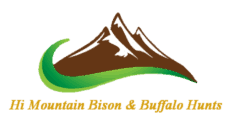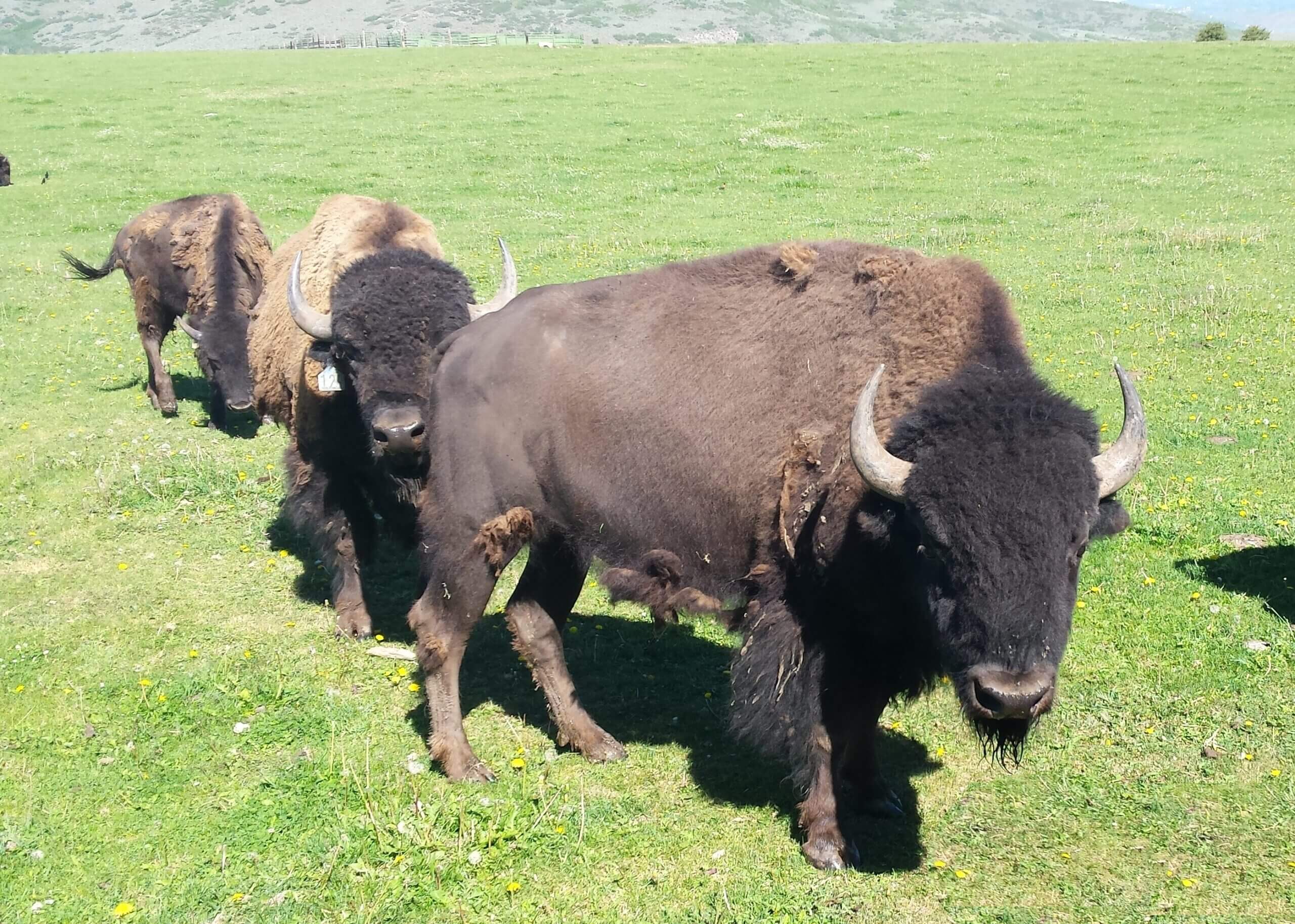The following is an article written our founder, Dick, and originally published by the Western Bison Association. While the intended audience is focused on other buffalo herd owners, it will be useful to you as you consider your own visit at Hi Mountain Bison and Buffalo Hunts.
TEN LEARNINGS FROM A BISON HUNTING OPERATION
HI MOUNTAIN BISON & BUFFALO HUNTS - DICK AND ELAINE JORGENSON
We have operated a bison hunting operation in Peoa, Utah for fifteen years. We run the herd of approximately 70 on 150 acres at an elevation of over 6,000 feet above sea level. We offer hunts year round and have had hunters in every month. We raise about one-half of the animals we hunt and purchase the rest. Following are some of our observations and learnings:
1) Safety is really important and must be worked on constantly. Customers are unpredictable; weather is unpredictable; bison are unpredictable. Many who have commented on our operation have suggested that the risks involved in a hunting operation outweigh any benefits. Insurance is a must and can be obtained from an insurance broker. We started with a “farm” policy and thought we were covered. Upon change of an agent, we were informed that because we charged for a service, our farm policy did not cover our hunting operation. We found that there are policies specifically for commercial outfitting operations and we would recommend seriously considering this type of policy. We have each hunter sign a “release” to give us some legal protection. We limit our operation to children eight years and older. As each hunter arrives, we have a safety orientation covering risks we may encounter that day and our approach to work with them. One attorney who came to hunt commented on all of the risks we had. A short time later his gun accidentally fired, but he had it pointed in a safe direction. Safety is a big “failure path” and must be managed. Handling bison is dangerous. Do not get between a cow and her calf. If we find an animal that is mean, aggressive or wanders, we move them from the herd as soon as we can.
2) Most customers are really good to work with, however, there is the occasional one that can ruin it for everyone. Over 90% of the customers are easy to work with and some have become great friends. The other 10% comprise a group that can make you want to give up the operation. We generally require a deposit to set up the hunt and hold an animal. On a rare occasion, we have gone with the word of a hunter that they will be there, so we have scheduled the hunt and held an animal without the deposit. In all too many cases, the hunter has not shown up. In one case, we held an animal for a hunter. Another came by and wanted the animal we were holding. It that case, the original hunter never showed up. We now require a deposit to hold any animal. Many come who have never shot the rifle they are using which is not fair to the animal, nor anyone else. We do not require them to “qualify” before the hunt, but there is sure an argument to do that. Some come with too few bullets. Some too few arrows, so we have to be prepared with a back-up rifle. We work hard to assure that all communication is clear, including cost of animal and any other costs, but on occasion, communication is incomplete and the client will use that to their advantage. On a rare occasion a client will try and take over the herd and ranch. We make it clear they are guests, and we are the owners and they need to follow our direction, or they are free to leave. We have asked two to leave without completing the hunt. We make it clear that alcohol, hunting and guns do not mix.
3) A hunting (harvest) operation is not for everyone. Some clients just do not want to “hunt” or harvest an animal in a fenced area. Others will hunt a fenced area if it is very large. As we discuss our operation with each client, we are clear to explain just what we do. Sometimes we just mention that our buffalo hunt just doesn’t work for everyone. Most will make a quick decision to come or to try somewhere else. We would rather have them go somewhere else than come and be disappointed. Some clients want a bison, but do not want to shoot or harvest the animal. In those cases, we deliver the animal to the butcher. We serve a specialized niche that does not work for everyone.
4) There is a need to constantly protect and be humane to the herd. We have had three hunters shoot into the herd causing the loss of a second buffalo. It is difficult to determine that a second buffalo has been wounded because coats are thick and it is cold in the winter. Therefore, it is difficult to find blood. One hunter clearly shot into the herd. We followed the herd in the snow and were not able to find any blood. A week later one buffalo died. We find that a bullet can ricochet or send a bone fragment when hit at close range. Many times a bow hunter and occasionally a rifle hunter will hit an animal with a non-fatal shot. It is important to finish the animal in a quick, humane way. We require a rifle back-up with a bow hunt and a quick finish when hit with a rifle. We also carry a rifle for use in emergency situations, such as a rifle malfunction, the hunter has no more shells, or other unforeseen circumstances.
5) There is a need to have a good butcher available to help. We have had butchers on site to help, dress the animals ourselves and also we refer to off-site butchers. Butchers need to understand that the meat on a large bison can spoil in the shoulder or hip area. The quarters need to be opened to allow proper cooling. We have recently had reports that hunters are not getting all of the bison meat returned from the butcher. It is important to have a reliable, honest butcher to be a member of the team. The client will blame both if the amount of returned meat is less than expected. We provide information, as accurately as we possibly can on how much meat to expect from a bison to reduce disappointment.
6) There is a need to refer or provide taxidermy services. A good taxidermist is also an important member of the successful team. Many clients want to look at the whole cost to buy, hunt, process and mount the bison. It creates problems when the taxidermist does not deliver a quality product on time. We negotiate prices with taxidermists and represent the client. We find we can get a better quality product in a more timely manner if we negotiate prices and delivery times with the taxidermists. We ask for quality work, delivered on time, and that the taxidermist keeps the client informed on progress of the taxidermy work.
7) There is a need to have a business plan to succeed which may include several “lines of business.” Early in our business, we worked with the Small Business Administration to develop a business plan. A successful business needs adequate funding for purchase of animals, fencing, feed, handling equipment, veterinarian work, and advertising to name a few. A hunting operation can have a few other lines of business in addition to hunting. There is a little money in working with hides, heads, canes and bison hair. We have a primary focus of hunting, but expect a calf from cows that are not taken in the hunt. It is more difficult to get a high percentage calf crop when we upset the social order by taking the herd bull, or lead cow, but with proper management, we get a decent calf crop. We also sell bulls and cows for breeding and calves for a variety of uses on occasion. We occasionally harvest an animal to sell to customers who are looking for less than a whole bison. We find this takes quite a bit of time and entails some risk that comes along with handling any food product. Advertising is key to an effective business plan. We do a great deal ourselves and also employ one booking agent.
8) There is a need to provide some services such as, skinning, gutting, loading and sometimes lodging. We are located in an area where we have a fairly close population of over one million. We are able to work with others to provide lodging, processing, taxidermy and other services. We prefer to focus on hunting primarily, but will skin for out-of-state hunters It is critical to have a way to load the bison without danger to others and equipment. On occasion, a hunter will bring a camper, so we provide some limited services for those hunters such as electricity and other services upon request. Providing lodging substantially increases business costs.
9) Allow for upgrades, about 10% will do that. We require a deposit to hold an animal and set up a hunt date. We let hunters know that if they want to upgrade, that will be possible depending upon availability of animals. We guide hunters to animals in classes where we have extra animals. Some just want a meat animal, so if we are short on bulls, we will ask them if they would consider a cow. Many are willing to change based on our discussion of the animals with them. Hunters differ in what they are looking for. Some want high quality meat, others quantity of meat, some a robe, some the head, some animals totally grass fed, some animals which have had no medication, and some a combination of requests. We try to listen carefully to the customer and meet their requests with the animal that most closely meets their needs.
10) It is important to make friends with and government officials that may be impacted or are needed to support or allow the business to succeed. We have discussed our operation with local police, sheriff, county commission, county attorney and mayors. On occasion we have had some involvement with the Utah Department of Fish and Game. Some advance work with these officials can help of offset comments and sometimes complaints from neighbors and concerned citizens. Some neighbors may have concerns with bison being close to their animals and land. Some advanced work with them on the operation, fencing and other concerns can help with situations that inevitably arise.
These are some of the learnings we have had from our fifteen years of experience. Please feel free to agree, disagree or add additional comments by contacting us or giving us a call.

